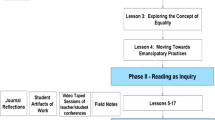Abstract
The work of Jacques Rancière has become rather popular of late, with a series of high-profile advocates. In this article, we reflect on an elementary classroom and an experiment with pedagogy inspired by Rancière’s (1991) text, The Ignorant Schoolmaster. The authors discuss the text, outline a 20-lesson response that emerged from the study (focusing on reading-as-inquiry), and highlighting some of the possibilities, tensions, and ambiguities involved. The article concludes with discussion of how we sought to make sense of, and redistribute, our roles as science teacher-researchers by embracing teaching, will, and instability. We suggest becoming ignorant schoolmasters, wandering beyond the domain of the sensible, as we struggle to come to different terms with our political work.
Résumé
Les écrits de Jacques Rancière ont récemment connu une certaine popularité, soutenue par de nombreux partisans très en vue. Dans cet article, nous nous penchons sur une expérience réalisée dans une classe de primaire, dont les aspects pédagogiques s’inspirent du Mâıtre ignorant de Rancière. Les auteurs examinent le texte et produisent un ensemble de 20 leçons (centrées sur la lecture-enquête) dont ils soulignent les possibilités, les tensions et les ambiguités. L’article se termine par une analyse des façons dont nous avons cherché à comprendre et à redéfinir notre rôle d’enseignants et de chercheurs scientifiques, en tenant compte de «l’enseignement», de «la volonté» et de «l’instabilité». Nous proposons de devenir des mâıtres ignorants, qui vont au-delà du domaine du sensible pour finalement repenser notre travail politique.
Similar content being viewed by others
References
Bazzul, J. (2013). Emancipating subjects in science education: Taking a lesson from Patti Lather and Jacques Rancière. Cultural Studies of Science Education, 8, 245–251. doi:10.1007/s11422-013-9481-z
Bazzul, J. (2015). Towards a politicized notion of citizenship for science education: Engaging the social through dissensus. Canadian Journal of Science, Mathematics and Technology Education, 15(3), 221–233.
Biesta, G. (2010). A new logic of emancipation: the methodology of Jacques Rancière. Education Theory, 60(1), 39–59. doi:10.1111/j.1741-5446.2009.00345.x
Biesta, G. (2013). The beautiful risk of education. Boulder, CO: Paradigm Publishers.
Biesta, G., & Bingham, C. (2012). Response to Caroline Pelletier’s review of Jacques Rancière: Education, truth, emancipation. Studies of Philosphy of Education, 31, 621–623.
Cochran-Smith, M., & Lytle, S. L. (1993). Inside outside, teacher research and knowledge. New York, NY: Teachers College Press.
Ellsworth, E. (1989). Why doesn’t this feel empowering? Working through the repressive myths of critical pedagogy. Harvard Education Review, 59(3), 297–324.
Fang, Z., & Wei, Y. (2010). Improving middle school students’ science literacy through reading infusion. The Journal of Educational Research, 103(4), 262–273.
Galloway, S. (2012). Reconsidering emancipatory education: Staging a conversation between Paulo Freire and Jacques Rancière. Educational Theory, 62(2), 163–184.
Goodwin, W. L., & Goodwin, L. D. (1996). Understanding quantitative and qualitative research in early childhood education. New York, NY: Teachers College Press.
Guthrie, J. T., Van Meter, P., Hancock, G., Alao, S., Anderson, E., & McCann, A. (1998). Does concept-oriented reading instruction increase strategy use and conceptual learning from text. Journal of Educational Psychology, 90(2), 261–278.
Hodson, D. (2011). Looking to the future: Building a curriculum for social activism. Rotterdam, The Netherlands: Sense Publishers.
Lather, P. (2012). Rancière as post-Foucauldian. In M. Whittaker (Chair). Taking Rancière to school: An impossible curriculum. Symposium conducted at 2012 American Educational Research Association,Vancouver, BC, Canada. Extended abstract retrieved from AERA’s online repositoryhttps://doi.org/www.aera.net/
May, T. (2008). The political thought of Jacques Rancière: Creating equality. Edinburgh, Scotland: Edinburgh University Press.
Means, A. (2011). Jacques Rancière, education, and the art of citizenship. The Review of Education, Pedagogy, and Cultural Studies, 33, 28–47.
Norris, S., & Phillips, L. (2002). How literacy in its fundamental sense is central to scientific literacy. Science Education, 87(2), 224–240.
Ødegaard, M., Haug, B., Mork, S. M., & Sørvik, G. O. (2014). Challenges and support when teaching science through an integrated inquiry and literacy approach. International Journal of Science Education, 36(18), 2997–3020.
Ontario Ministry of Education. (2007). The Ontario Curriculum Grades 1–8 — Science and Technology. Toronto, Canada: Author.
Pelletier, C. (2012). No time or place for universal teaching: The ignorant schoolmaster and contemporary work on pedagogy. In J. P. Deranty & A. Ross (Eds.). Jacque Raciere and the contemporary scence (pp. 99–116). London, England: Continuum Press.
Phillips, L.M., & Norris, S.P. (2009). Bridging the gap between the language of science and the language of school science through the use of adapted primary literature. Research in Science Education, 39, 313–319. doi:10.1007/s11165-008-9111-z
Power, N. (2010). Axiomatic equality: Rancière and the politics of contemporary education. Retrieved from https://doi.org/www.eurozine.com/articles/2010-07-01-power-en.html/articles/2010-07-01-power-en.html. First published in Polygraph 21 (2009).
Rancière, J. (1991). The ignorant schoolmaster: Five lessons in intellectual emancipation (K. Ross, Trans.). Stanford, CA: Stanford University Press.
Rancière, J. (2009). A few remarks on the method of Jacques Rancière. Parallax, 15(3), 114–123.
Romance, N. R., & Vitale, M. R. (1992). A curriculum strategy that expands time for in-depth elementary science instruction by using science-based reading strategies: Effects of a year-long study in grade four. Journal of Research in Science Teaching, 29(6), 545–554.
Roth, W. M., & Barton, A. C. (2004). Rethinking scientific literacy. New York, NY: Routledge Falmer.
Ruitenberg, C. (2008). What if democracy really matters. Journal of Educational Controversy, 3(1). Article 11. Retrieved from https://doi.org/cedar.wwu.edu/jec/vol3/iss1/11/jec/vol3/iss1/11
Safstrom, C.-A. (2014). The passion of teaching at the border of order. Asia-Pacific Journal of Teacher Education, 42(4), 337–346. doi:10.1080/1359866X.2014.956045
Stake, R. (2000). Case studies. In N. K. Denzin & Y. S. Lincoln (Eds.). Handbook of qualitative research (pp. 435–454). Thousand Oaks, CA: Sage.
Suoranta, J. (2014). Jacques Rancière on radical equality and adult education. In M. Peters, P. Ghiradeli, B. Zarnic, & A. Gibbons (Eds.). Encyclopedia of philosophy of education. Retrieved from https://doi.org/www.ffst.hr/Encyclopedia/Encyclopedia
Van Wynsberghe, R., & Khan, K. (2007). Redefining case study. International Journal of Qualitative Methods, 6(2), 1–10.
Author information
Authors and Affiliations
Corresponding author
Rights and permissions
About this article
Cite this article
Otoide, L., Alsop, S. Moments With Jacques Rancière: Sketches From a Lived Pedagogical Experiment in an Elementary Science Classroom. Can J Sci Math Techn 15, 234–247 (2015). https://doi.org/10.1080/14926156.2015.1062939
Published:
Issue Date:
DOI: https://doi.org/10.1080/14926156.2015.1062939




